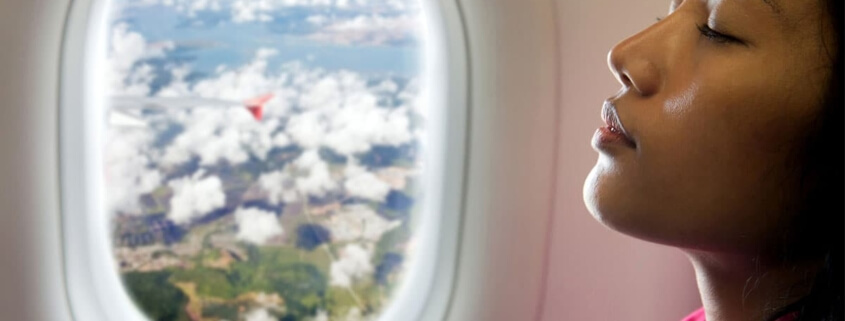Why Does Flying Make You Tired? What Can You Do About It?
Patients occasionally ask me why they always seem to feel so drained after a flight. So, I figured I’d address the topic—and give you some advice about how to prevent it.
To clarify, I’m not talking about jet lag here. That’s when you cross time zones, so your body’s internal clock isn’t synced up to the local time. If your destination is five hours ahead of your home time, obviously you aren’t going to be ready for bed when the locals are. There are good ways to minimize the effects of jet lag, but that’s a subject for another post.
Right now I’m discussing that feeling of physical fatigue that sets in on your flight or within a short time of getting off the plane. It’s a common phenomenon, but if you understand the causes, it’s not too hard to keep this flight-related tiredness at bay.
Altitude and Dehydration
When you fly at an elevation of 35,000 feet, even in a pressurized cabin, it’s effectively the same as being up around 8,000 feet high (roughly equivalent to being atop a large mountain). If you’ve ever gone skiing, you know they always tell you, “You have to stay hydrated.” That’s because at high altitudes, the low humidity causes you to lose more fluids.
On a flight, the atmosphere has approximately 1 to 2 percent humidity. At sea level, in contrast, we often experience humidity levels around 40 to 50 percent. Humidity simply refers to the amount of water molecules in the air. So, at sea level there are far more water molecules in the air than there are in the airplane cabin. At higher elevations, more water passes from you into the air, and this can cause low fluid levels or dehydration. In turn, dehydration causes you to feel tired.
Preventing Tiredness from Losing Fluids
Staying hydrated is key to preventing that sluggish, sleepy feeling you get from flying. Drink about eight ounces of water per hour of flight time to replace the fluids you lose. Also, stay away from dehydrating products—namely, caffeine and alcohol. These are diuretics, meaning they make you urinate more, and that drains you of more fluids.
The low humidity can cause your mucus membranes and nasal passages to start drying out, too. This causes unpleasant feelings and can also make you more prone to picking up microbes that make you sick. Drinking water and avoiding dehydrating agents helps a lot, but there are other remedies as well. Try a saline nasal spray, or rub some Vaseline or other petroleum jelly product on your lips and at the base of your nose.
Not-so-Good Vibrations
There’s another factor that can increase your tired feeling during and after a flight. As the airplane’s turbines rotate during flight, they generate subtle but constant vibrations that you don’t experience on the ground and aren’t accustomed to. Most people don’t even notice these vibrations, but throughout the flight, they’re gyrating your muscles, bones, and connective tissue, and this also saps your energy.
While you can’t stop the turbines, you can better isolate your body from the vibrations they send out. Create some additional padding between you and your seat. Sit on a cushion, lean on pillows, or even drape a blanket or two over your seat.



